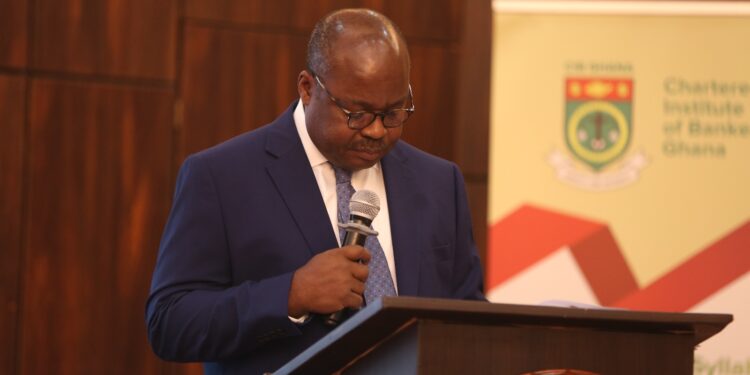Bank of Ghana Governor Calls for Resilience in Banking Amid Emerging Horizon Risks
Ghana’s financial system must brace itself for a complex array of emerging challenges as the interconnectedness of global markets heightens external risks, Governor of the Bank of Ghana Dr. Ernest Addison warned on Thursday.
Addressing the 28th Annual National Banking and Ethics Conference organized by the Chartered Institute of Bankers in Accra on November 21, 2024, he stressed the urgency of proactive regulation and strategic foresight in navigating “horizon risks” such as technological disruptions, climate vulnerabilities, and shifting economic conditions.
Speaking on the theme “Resilience in the Financial System: Navigating Horizon Risks,” Dr. Addison highlighted the Bank’s efforts to fortify the sector. He outlined recent regulatory reforms aimed at improving risk management, tightening capital requirements, and bolstering corporate governance, all intended to enhance transparency and market discipline.
Notably, the Bank has introduced directives on sustainable banking principles, climate-related financial risk, and cyber and information security to foster responsible banking practices in line with global trends.
Yet, these measures alone may not suffice in addressing the complexities of emerging risks, the Governor cautioned. “The strategy toward addressing such horizon risks is multi-dimensional,” he said, emphasizing the need for innovative approaches to tackle threats posed by rapid technological change, climate shifts, global economic shocks, and challenges to business model sustainability.
Dr. Addison’s remarks come at a time when central banks globally are grappling with balancing financial stability against a backdrop of escalating uncertainties. He underscored that resilience requires collective action, asserting that regulators, financial institutions, and professional bodies must work in unison.
“Resilience cannot be achieved by regulation alone. It is a responsibility we all share,” he said.
The Governor also called attention to the importance of workforce preparedness in an era of technological and environmental transformation, urging the sector to prioritize integrity, adaptability, and vigilance in its response to unforeseen risks.
In a rallying call to the banking community, Dr. Addison stated, “The path to resilience requires collaboration, innovation, and, most importantly, an unwavering commitment to ethical principles. Together, we can fortify our banking sector, navigate risks on the horizon, and ensure that the financial system remains a pillar of strength for Ghana’s economy.”
The conference – an annual fixture in Ghana’s financial calendar – brought together industry leaders to discuss the intersection of ethics and resilience in navigating the challenges of a rapidly evolving financial landscape.
Dr. Addison’s emphasis on sustainable practices and ethical principles reflects growing global recognition of the need to align financial systems with broader environmental and social imperatives.
As the banking sector adapts to a volatile risk environment, the Bank of Ghana’s focus on proactive governance and strategic foresight underscores its determination to safeguard the sector’s stability and promote long-term growth.








